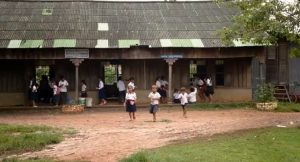Education in Cambodia

This research addresses the question of teacher effectiveness in the context of early grade school education in Cambodia. In all education settings the challenge of enhancing teaching capability to achieve better learning outcomes is complex and multifaceted. In the context of early grade education in Cambodian schools, this is especially the case. Cambodian education is like the ‘perfect storm’ of challenges. In addition to the under-developed, largely agrarian economy we have the unique and terrible recent history of oppression that specifically targeted educators. With 75% of teachers and 96% of university graduates killed, the trauma resonates to this day and nowhere more so than in the thousands of schools and in the minds of the teachers and communities on whom they depend.
This study will investigate how teachers in Cambodia and specifically the Battambang Province, can be enabled to improve their teaching practice and engage in a path of professional development. It will focus on the tasks and challenges of building teacher professional identity; how teachers see themselves and how this may change over time.
Overall, learning outcomes in Cambodia are poor in comparison with other countries and this is especially true for girls from hard-to-reach communities. Data[1] from national assessments for Grades 3, 6 and 8 over the period from 2015-2017 in the core subjects of Khmer and Mathematics show that achievement levels were at or below 50% and that there were no signs of an improving trend. Consequently, lower secondary students may leave school early, especially in Grade 9, when they find learning too difficult. The same can be said for the transition from lower to upper secondary schools, where weak foundational standards in basic education prevent students succeeding at higher grade levels.
Teacher training is a key enabler for student success. The situation for teacher training in Cambodia is described in the OECD 2018 report Education In Cambodia: Findings from Cambodia’s Experience in PISA for Development as follows:
Pre-service teacher training for pre-primary education, primary education and lower secondary education is only 2 years, while the training for upper-secondary education takes a rather short period of one year. Given the shortage of teachers following the collapse of Khmer Rouge, the entry requirement for the pre-service teacher training for lower secondary education or below requires only 12-years education, while the entry requirement for upper secondary teacher training needs 16-years education. The low entry point and short training duration affect educational attainment levels of teachers considerably. (p76)
The same report characterises in-service provision as follows:
Teacher data shows that there is limited professional development to compensate for low teacher qualification in Cambodia. About 27% of teachers reported having attended further education programmes. One out of three reported having attended courses or workshops on teaching methods and on their subject matter; whereas only some 12% of teachers experienced visiting other schools to learn about teaching and learning conditions.
In recent years interventions focused on instructional methods, assessment design and the development of resources in order to improve educational outcomes for the early grades. The results from these interventions did not always meet expectations[2]. Despite these numerous innovations in policy, infrastructure and technology there is still one simple truth that underpins the education system; it is that the quality of learning depends essentially on the quality of teaching.
Teaching is at the heart of learning in school and there is no substitute for a fully resourced, and competent teacher to encourage, guide and assess attainment in the early grades. International evidence points to teaching capability as a core enabler for improved learning outcomes[3]. Teaching capability incorporates not just teacher knowledge and skills, it also extends to lesson-plans resources, school support structures and community buy-in. A core quality often overlooked is the teacher’s own professional identity and attitude. That is why this research is concerned with the development of professional identity for teachers in Cambodia.
Find out more about Cambodian National Development.
Find out more about the Overarching Research Goal.
Find out more about how this research addresses Gender Equality and Quality Education.
This project is funded by the Irish Research Council.
#LoveIrishResearch
[1] MoEYS, Results of Grade 6 Student Achievement from the National Assessment in 2015,16,17, (Phnom Penh: Education Quality Assurance Department (EQAD), 2015,16,17).
[2] Chae-Young Kim, and Martyn Rouse, “Reviewing the Role of Teachers in Achieving Education for All in Cambodia,” Article, Prospects 41, no. 3 (2011).
